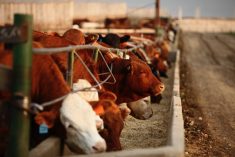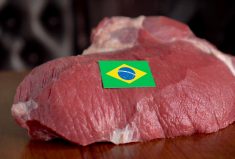Sao Paulo | Reuters — JBS SA has scrapped a program to move some operations outside Brazil after a government agency vetoed the move, sending shares of the world’s biggest beef exporter tumbling and dealing a blow to a plan to become a global food processing powerhouse.
In a Wednesday securities filing, Sao Paulo-based JBS said that BNDES Participacoes SA, the investment arm of Brazil’s state development bank BNDES, opposed the plan, which included separating the company’s global operations and moving them to Ireland.
BNDES did not explain why it challenged the reorganization plan, JBS CEO Wesley Batista told analysts on a call from Colorado. A BNDES representative said the state agency will comment later Wednesday.
Read Also

JBS profit falls amid still-challenging US market environment
JBS, the world’s largest meat company, reported a net profit fall in the third quarter in spite of a rise in global net sales amid a still-challenging beef market environment in the U.S., according to an earnings statement on Thursday.
“The bank thought it was not the best road ahead for the company,” said Batista, adding that the current shareholder agreement with BNDES would end in 2019, which would then free it to reorganize operations.
Shares of the world’s No. 1 meatpacker plunged nearly 18 per cent on Wednesday, the most in eight years, signalling frustration with the end of a plan aimed at accelerating JBS’s growth, reducing fundraising costs, optimizing taxes and attracting a wider base of investors.
“This is a major negative surprise. The listing process had already been moving since May and a veto from this shareholder was totally unexpected,” said Pedro Leduc, an analyst with JPMorgan Securities. BNDESPar holds 20 per cent of JBS, making it the company’s No. 2 shareholder, after the Batista family’s 45 per cent stake.
Batista said there were alternatives to the reorganization but did not elaborate, except to say that listing North American assets on the New York Stock Exchange was one possibility. The region is the biggest source of revenue for JBS globally.
Among JBS USA’s businesses are one of the biggest beef packing plants in Canada — the former XL Lakeside plant at Brooks, Alta., with capacity to process about 4,000 head of cattle per day — and a cattle feeding operation nearby.
Under terms of the plan proposed in May, the JBS Foods International unit was to be listed in New York. Investors saw the move as the best way for JBS to become the first Brazilian multinational with a clear division of local and global assets.
The billionaire Batista brothers Wesley and Joesley, who are JBS’s CEO and chairman, respectively, expected the reorganization to be ready by November.
Change of command
The company’s shares fell as much as 17.6 per cent to 9.72 reais in Sao Paulo, their biggest drop since Oct. 15, 2008, cutting into their gains this year. Since the reorganization was announced, JBS had risen 43 per cent.
The reorganization was devised before a new Brazilian government swapped the senior management of BNDES. President Michel Temer tapped economist Maria Silvia Bastos to run BNDES and BNDESPar, replacing Luciano Coutinho, who was for years seen as a supporter of the Batistas’ push to internationalize JBS.
The idea of splitting Brazil-based and global assets gained traction because most of JBS’s revenues now come from overseas units, especially from North America. According to people with knowledge of the situation, executives had told investors in several road shows promoting the reorganization that BNDESPar was on board with the plan.
Abandoning the reorganization plan comes at a time when JBS has fallen under increased scrutiny from prosecutors and government auditors for allegedly providing Brazil’s former ruling Workers Party with illegal donations in the 2014 presidential campaign. JBS denied making any undeclared donations to the party or ruling coalition allies.
— Reporting for Reuters by Reese Ewing and Guillermo Parra-Bernal; additional reporting for Reuters by Tatiana Bautzer in Sao Paulo.














